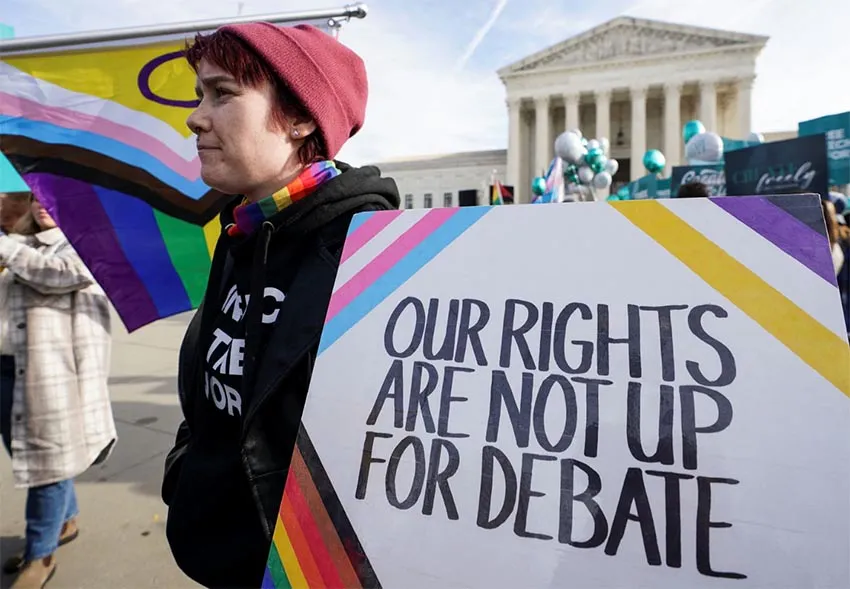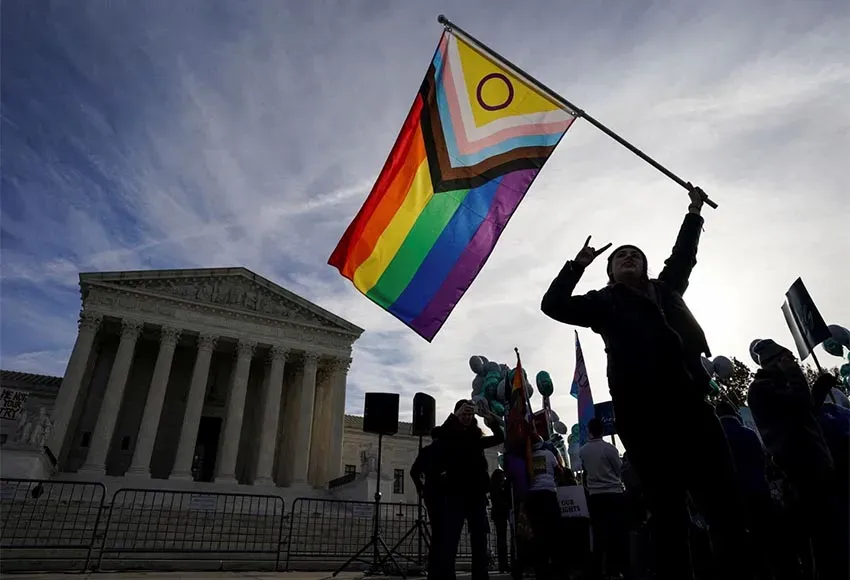On June 30, 2023 – the final day of Pride Month – the United States Supreme Court announced its ruling in 303 Creative LLC v. Elenis.
The court ruled 6-3 in favor of Lorie Smith, a Colorado graphic designer who argued that her First Amendment right to free speech was violated by the Colorado Anti-Discrimination Act (CADA), which she claimed would be used against her if she were to move forward with her website design business. Justice Neil Gorsuch wrote, "The First Amendment prohibits Colorado from forcing a website designer to create expressive designs speaking messages with which the designer disagrees."
Though Smith had not yet been challenged by CADA, the court determined she had standing to sue due to the fact that CADA had been invoked in a similar antidiscrimination case in 2018, Masterpiece Cake Shop vs. Colorado Civil Rights Commission. The fact that the court took up a case that was prompted primarily by hypotheticals was unprecedented, though the 10th Circuit also held that Smith had standing to sue due to "a credible threat that, if she follows through on her plans to offer wedding website services, Colorado will invoke CADA to force her to create speech she does not believe or endorse," Justice Gorsuch wrote.
The court found that due to the specifics of the case, any attempt to punish or force Smith to create wedding websites for same-sex couples would be a violation of her free speech rights.

The danger of discrimination
One key argument used by the defense was to point out just how damaging one small act of discrimination can be. Like a ripple, Smith's refusal to serve LGBTQ+ couples who seek services for weddings not only emboldens others who hold homophobic beliefs to voice them more freely, but it spreads the message that there is something wrong with LGBTQ+ people.
Christy Mallory, legal director for the Williams Institute, helped to submit an amicus curiae brief to the court touching on this very issue. "One of our senior scholars here, his name is Ilan Meyer, has studied the impact of discrimination stigma on LGBTQ folks," Mallory told the SGN. "His brief addressed the negative health outcomes that can result from being turned away or discriminated against when trying to seek services."
Meyer's study, which was shared with the court, found that discrimination stigma can lead to increased cases of depression and suicide – both of which impact the LGBTQ+ community in high numbers.
Despite the defense's argument that allowing written intent to discriminate would cause emotional and psychological harm to those in the LGBTQ+ community, the court agreed that Smith's speech, no matter how despicable, was still protected by the Constitution.
"These cases illustrate that the First Amendment protects an individual's right to speak his mind regardless of whether the government considers his speech sensible and well intentioned or deeply 'misguided,' and likely to cause 'anguish' or 'incalculable grief,'" the ruling said.

What is speech? What is art?
The court also clarified that creating an online website can be considered speech.
"Speech conveyed over the internet, like all other manner of speech, qualifies for the First Amendment's protections," Gorsuch argued.
The court also ruled that because Smith is applying her own creative touches to the (hypothetical) websites, including written narratives and artwork, her speech is protected. The court brought up District Chief Judge Tymkovich's dissent, which remarked that if the state is allowed to place limitations on Smith's artwork, it must regulate all works of art.
"I think the court was very careful here to say that it was this particular website that she was creating – it's not [that] all websites are automatically speech," Mallory observed. "To say it's all websites is really broad... It's really about how she used stories, how she used photos... Bringing her own creative touch and expertise was all super relevant to the court here. I think that the creative, personalized, expressive aspect was super important to the court here, so I don't think this was necessarily a broad expansion of what speech is."
The court concluded that the CADA would (hypothetically) force Smith to speak if it required her to offer her services to LGBTQ+ couples seeking a wedding website, as Smith does not agree with same-sex marriage. The majority determined that any punishment or repercussions she would face if the Colorado law were to be invoked would be unconstitutional.
"If she wishes to speak, she must either speak as the State demands or face sanctions for expressing her own beliefs," Gorsuch wrote. "Sanctions that may include compulsory participation in 'remedial ... training,' filing periodic compliance reports, and paying monetary fines. That is an impermissible abridgement of the First Amendment's right to speak freely."
Specific distinctions
The court made many distinctions to justify its ruling. The majority determined that Smith's refusal to create websites for same-sex couples looking to wed was not discrimination, because Smith agreed to create other services for LGBTQ+ people, just as long as those did not advocate for anything against her personal beliefs.
"She has never created expressions that contradict her own views for anyone – whether that means generating works that encourage violence, demean another person, or defy her religious beliefs by, say, promoting atheism," the court determined.
The court also clarified that this decision does not permit discrimination against the LGBTQ+ community on the grounds of religion; it only pertains to free speech. Had Smith's defense leaned on her right to religious freedom, the verdict very well could have gone in a different direction.
A recent study out of UCLA and the University of Chicago has also found that most Americans do not support discrimination against LGBTQ+ people on the grounds of religion.
"The majority of Americans opposed using religious beliefs to discriminate against LGBTQ+ people in the three sectors we looked at – which were employment, healthcare, and public accommodations," Mallory said. "The issues are a little bit different here. We didn't ask about free speech protections, but it's just the result of the Supreme Court interpreting the Constitution ...and applies the protections versus what the general public thinks should happen."
Furthermore, the court ruled that because same-sex couples in Colorado have other options for website design companies, because Smith does not hold a monopoly over the industry, and because her services are non-necessity, her refusal to serve them will not cause harm.
Legal experts, like Mallory, believe this is not the case. "I would say that after this case, we will continue to see folks attempting to turn away LGBTQ+ people and same-sex couples based on probably very similar rationale," Mallory said.
"Of course, the court's reasoning was very specific to the facts of this case, so they don't really set out a clear rule here for determining when the First Amendment would protect those refusals versus when it wouldn't, but [it suggests] there are times when it will not, and obviously the holding suggests there are times when it will, so that's going to have to be determined by a case-by-case basis."
The queens of the court dissent
Of course, not all members of the court agreed with the ruling. Justice Sonia Sotomayor, joined by Justices Elena Kagan and Ketanji Brown Jackson wrote a lengthy dissent.
"Today, the Court, for the first time in its history, grants a business open to the public a constitutional right to refuse to serve members of a protected class," Sotomayor said.
"Our Constitution contains no right to refuse service to a disfavored group. I dissent," she continued.
Sotomayor pointed out that just because Smith's business offers customizable and artistic options for clientele does not mean it should be considered art or free speech.
"A majority of the Court agrees that because the business offers services that are customized and expressive, the Free Speech Clause of the First Amendment shields the business from a generally applicable law that prohibits discrimination in the sale of publicly available goods and services," Sotomayor explained. "That is wrong. Profoundly wrong."
In their dissent, Sotomayor, Kagan, and Brown-Jackson pointed out that CADA does not regulate speech but conduct.
They also brought to attention the fact that CADA's communication clause makes it unlawful for a business to explicitly state its intent to refuse service to anyone based on protected traits.
"Just as a business open to the public may not refuse to serve customers based on race, religion, or sexual orientation, so too the business may not hang a sign that says, 'No Blacks, No Muslims, No Gays,'" she added.
Repercussions
Public accommodations laws provide equal access to publicly available goods and services and ensure equal dignity in the common market. The dissenting justices explained one of the purposes for such laws.
Sotomayor reminded the court that publicly refusing service to a group of protected individuals has widespread repercussions, even if there is another option willing to provide services.
"When a young Jewish girl and her parents come across a business with a sign out front that says, "'No dogs or Jews allowed,'' the fact that another business might serve her family does not redress that "stigmatizing injury,'" Sotomayor remarked. "This ostracism, this otherness, is among the most distressing feelings that can be felt by our social species."
"I think people understandably had a very negative response to hearing this come down from the court," Mallory said. "One of the main things will be that it can instill a lot of fear in folks and they can be worried about going to seek services and being afraid of being turned away. [In] states with nondiscrimination laws on the book that would have applied to such a situation, they may feel that they now have lost their confidence in being able to approach providers for their weddings or other related services [since] now they might be turned away, and we know that fear can have a negative response in people even absent from experiencing discrimination."
The court's decision will have an effect not only on Colorado's public accommodations laws but on any state that has similar laws. The ruling will not have any impact on states without public accommodations laws.
"This is only going to affect cases in states that have protections," Mallory said. "There are no federal-level protections from public-accommodation discrimination based on sexual orientation or gender identity, so there is nothing to stop a business from discriminating against LGBTQ+ people in states that don't have protective laws. It will only change the status quo for people in states that have protections."

Playing by the rules
The dissenting justices also pointed out that Smith's participation in the public market means she must play by the rules. They argued that if she offered her services for free, they could be considered artwork and "protected speech," but because she aims to profit off of her business, she must comply with the laws that regulate the market.
"If a business chooses to profit from the public market, which is established and maintained by the state, the state may require the business to abide by a legal norm of nondiscrimination," Sotomayor explained. "In particular, the state may ensure that groups historically marked for second-class status are not denied goods or services on equal terms."
Throughout the dissent, Sotomayor, Kagan, and Brown-Jackson noted the discrimination the LGBTQ+ community has faced throughout US history, and the continued fight that is taking a toll on many as more states push to write laws which harm or erase them. The court's ruling was about more than just a hypothetical website, and the impacts of their decision will be felt for a long time to come.
"I fear that the symbolic damage of the Court's opinion is done," Sotomayor expressed. "But that does not mean that we are powerless in the face of the decision. The meaning of our Constitution is found not in any law volume but in the spirit of the people who live under it. Every business owner in America has a choice whether to live out the values in the Constitution. Make no mistake: invidious discrimination is not one of them."


